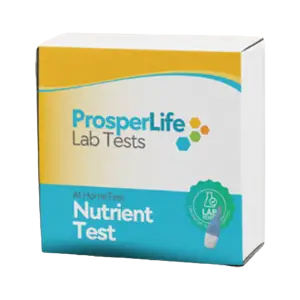GLOBAL SHIPPING | USA SHIPS FREE OVER $75
GLOBAL SHIPPING | USA SHIPS FREE OVER $75

If you’re experiencing persistent lethargy, you may not by properly absorbing nutrients. Vitamins and micronutrients play a vital role in overall health. Routine testing for vitamin deficiencies is essential, allowing you to make informed dietary adjustments or incorporate vitamin supplements into your daily routine. Take charge of your well-being and optimize your nutritional intake today.
Nutrient Health Panel
Magnesium is a mineral stored in your bones, tissues and cells that is important in producing energy, muscle and nerve function, heart health and bone strength. You absorb magnesium into your system through your small intestines when you eat foods such as spinach, whole grains, nuts, beans, bananas, milk, and salmon.
High Magnesium Levels – While not as common as low levels, high magnesium levels are typical in those with kidney damage or those who take certain drugs. Excessive levels of magnesium can cause serious complications, including cardiac arrest.
Low Magnesium Levels – Low magnesium levels can indicate inefficient mineral absorption often caused by excessive alcohol consumption, underlying kidney problems, certain medications, celiac disease or chronic digestive issues. Over time, magnesium deficiency can lead to decreased calcium and potassium levels, weak bones and negative effects on your heart.
Symptoms of long-term magnesium deficiency can include:
Vitamin B-12 (cobalamin) is an essential vitamin and plays an important role in blood cell formation, cell metabolism, nerve function and the production of DNA. It is found in foods such as meat, fish, dairy, and fortified foods such as breakfast cereal and is widely available as an oral supplement.
High Vitamin B12 Levels – Abnormally high B12 levels may suggest liver or kidney problems, diabetes, or certain forms of leukemia. Megadoses of the vitamin can lead to acne and rosacea.
Low Vitamin B12 Levels – While vitamin B-12 deficiency is not common in the US, people who follow a vegetarian or vegan diet might be prone to this deficiency because plant foods don’t contain vitamin B-12. Older adults and people with digestive tract conditions that affect absorption of nutrients may also be susceptible to vitamin B-12 deficiency
SYMPTOMS OF LOW VITAMIN B12 LEVELS:
Folate (vitamin B-9) is important in red blood cell formation for healthy cell growth and function. This nutrient is crucial during early pregnancy to reduce the risk of birth defects of the brain and spine. There is evidence folate can reduce the risk of various cancers and is helpful in treating depression.
High Folate Levels – While excess folate levels aren’t usually dangerous, they are linked to some conditions, including certain types of cancers.
Low Folate Levels – could be caused by the following: high alcohol consumption, diet low in folate, genetic factors and certain medications.
SYMPTOMS OF LOW FOLATE:
For most, a balanced diet usually provides all the folate you need. Folate is found in dark green leafy vegetables, beans, peas, nuts, oranges, lemons, bananas, melons, and strawberries. The synthetic form of folate is folic acid and is in many fortified foods, such as cereals and pastas.
Vitamin D plays a major role in regulating your immune system to help you fight off infection. Vitamin D also regulates many other cellular functions in your body. Its anti-inflammatory, antioxidant and neuroprotective properties support immune health, muscle function and brain cell activity. Knowing our Vitamin D levels will help you to understand your susceptibility to illnesses.
Low Vitamin D (25-OH D) levels- Deficiencies in Vitamin D can lead to low calcium absorption which in turn causes weakened bones that become soft and brittle and prone to fractures. Perhaps the most commonly known condition attributed to low Vitamin D levels is osteoporosis – a loss of total bone mass. Deficiency in Vitamin D may lead to rickets in children and adverse outcomes in pregnant women and may also contribute to the development of cancer, cardiovascular disease, type 2 diabetes, and autoimmune disorders.
SYMPTOMS OF LOW VITAMIN D:
Gather your personal lab sample whenever you want with our user-friendly test kit delivered right to your doorstep.
Quickly collect your sample from the comfort of your home using our ground- breaking Quick Draw device or traditional finger prick lancet.
Your lab results will be available on your personal online dashboard. Results are in an easy-to-understand educational format that helps you manage your health.
All tests are processed through our universitybacked, CLIA certified labs and HIPAA secure resultsare delivered in real time. After your test isprocessed, we offer in-depth results to not onlyhelp you make important decisions about your health in conjunction with your treating physician or medical team, but solutions to any health issues that may be discovered during the process.
Your cart is empty